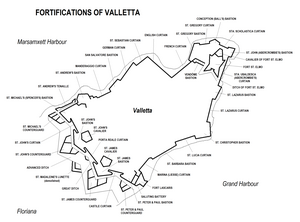Fortifications of Valletta
| Fortifications of Valletta | |
|---|---|
| Is-Swar tal-Belt Valletta | |
| Valletta, Malta | |

Valletta Land Front as seen from Manoel Island
|
|

Map of Valletta's fortifications
|
|
| Coordinates | 35°53′50″N 14°30′31.5″E / 35.89722°N 14.508750°E |
| Type | City wall |
| Site information | |
| Owner | Government of Malta |
| Open to the public |
Yes |
| Condition | Mostly intact |
| Site history | |
| Built | 1566–1570s |
| Built by |
Order of Saint John British Empire (some modifications) |
| In use | 1571–1970s |
| Materials | Limestone |
| Battles/wars |
Capture of Malta (1798) Siege of Malta (1798–1800) World War II |
| Events | |
| Type | Cultural |
| Criteria | i, vi |
| Designated | 1980 (4th session) |
| Part of | City of Valletta |
| Reference no. | 131 |
| State Party |
|
| Region | Europe and North America |
The fortifications of Valletta (Maltese: Is-Swar tal-Belt Valletta) are a series of defensive walls and other fortifications which surround the capital city of Valletta, Malta. The first fortification to be built was Fort Saint Elmo in 1552, but the fortifications of the city proper began to be built in 1566 when it was founded by Grand Master Jean de Valette. Modifications were made throughout the following centuries, with the last major addition being Fort Lascaris which was completed in 1856. Most of the fortifications remain largely intact today.
The city of Valletta, along with Nicosia in Cyprus, was considered to be a practical example of an ideal city of the Renaissance, and this was due to its fortifications as well as the urban life within the city. The fortifications were well known throughout Europe by the 17th century, and might have influenced the designs of part of the Fortress of Luxembourg. In an 1878 book, Valletta was described as "one of the best fortified [cities] in the world." Today, Valletta's fortifications are regarded as the most important of the fortifications of Malta, and they form part of a UNESCO World Heritage Site.
The construction of a fortified city on the Sciberras Peninsula was first proposed in 1524, when the Order of St. John sent a commission to inspect the Maltese Islands. Back then, the only fortification on the peninsula was a militia watchtower built by the Aragonese in 1488. The tower was strengthened in 1533, but the proposed city was not built since the Order focused on building the fortifications of Birgu, which had become their base.
...
Wikipedia

